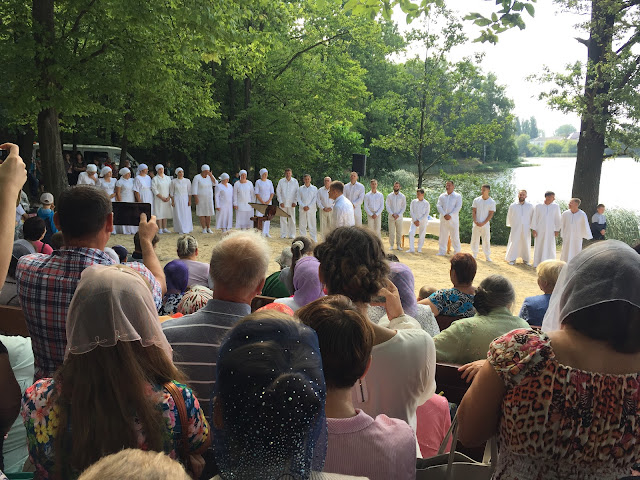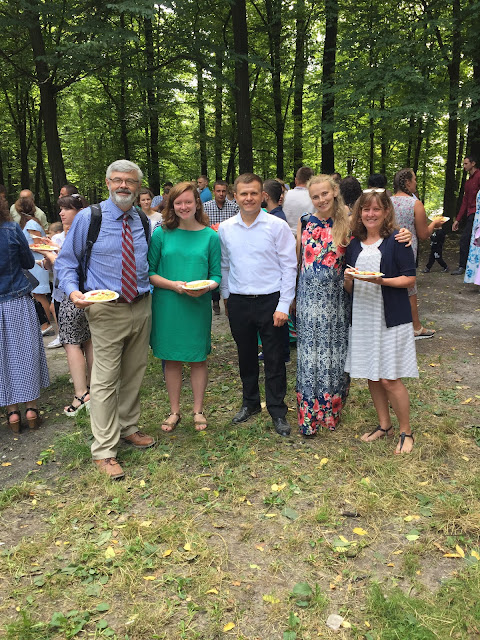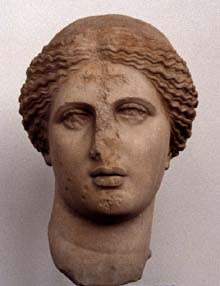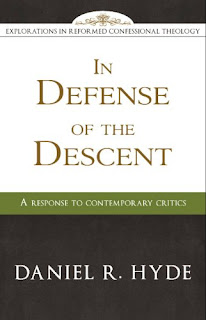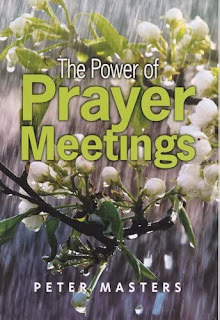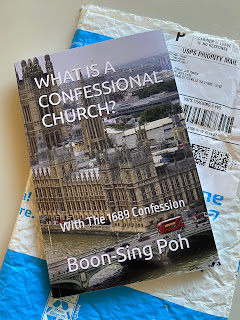Stylos is the blog of Jeff Riddle, a Reformed Baptist Pastor in North Garden, Virginia. The title "Stylos" is the Greek word for pillar. In 1 Timothy 3:15 Paul urges his readers to consider "how thou oughtest to behave thyself in the house of God, which is the church of the living God, the pillar (stylos) and ground of the truth." Image (left side): Decorative urn with title for the book of Acts in Codex Alexandrinus.
Monday, February 28, 2022
WM 228: Miklós Chiciudean, Reformed Baptist Church, Budapest
Saturday, February 26, 2022
Confessing Our Hope Podcast: "Kept Pure in All Ages," Confessional Bibliology, & the Received Text
Friday, February 25, 2022
The Vision (2.25.22): All manner of sin and blasphemy shall be forgiven
Note: Devotion taken from last Sunday's sermon on Matthew 12:31-37.
Wherefore
I say unto you, All manner of sin and blasphemy shall be forgiven unto men: but
the blasphemy against the Holy Ghost shall not be forgiven unto men (Matthew
12:31).
Christ
begins in v. 31a with a sweeping declaration that magnifies the great mercy and
forgiveness of the Lord: “All manner of sin and blasphemy shall be forgiven
unto men.”
That
is an amazing statement. God forgives all kinds of sin, and implied in this is
the fact that he forgives all kinds of sinners.
Consider
David in the Old Testament, how he committed adultery with Bathsheba and
arranged the murder of her righteous husband Uriah the Hittite. Nathan the
prophet confronted him and said, “Thou art the man” (2 Sam 12:7). But David
repented of his sin. He said to Nathan, “I have sinned against the LORD” (v.
13). Nathan then responds, “The LORD hath put away thy sin” (v. 13).
Think about Christ’s own ministry. He said to the paralytic, “Son, be of good
cheer, thy sins be forgiven thee” (Matt 9:2).
Several
notoriously sinful women described in the Gospels were forgiven by Christ.
First
there was the sinful woman of Luke 7, who washed his feet, through tears, with
her hair and precious ointment. Christ said to her, “Thy sins are forgiven” (v.
48).
Second, there was the Samaritan woman at the
well. She told those of her city, “Come,
see a man, which told me all things that ever I did: is not this the Christ?”
(John 4:29).
Third, there was the woman taken in the very act of adultery in
John 8. When her accusers melted away, Christ said to her, “Neither do I condemn thee:
go, and sin no more” (v. 11). Some in later generations
were so offended by this radical forgiveness that they even tried to suppress
this account and remove it from the Gospel!
Notice that Christ especially
singles out the fact that the sin of blasphemy, among these “many sins,” can
be forgiven. According to the law, the penalty for blasphemy was death by stoning
(see Leviticus 26:16). But
Christ proclaims that even blasphemy may be forgiven!
Think about the apostle Peter who,
when Christ was arrested, three times denied that he even knew him, crying out
with curses swearing and saying, “I know not the man” (Matt 26:74). And what
happened after the resurrection, as recorded in John 21? Christ fully restored
and re-commissioned Peter.
Beyond the Gospels, think about
Saul/Paul who held the clothing of the men who stoned Stephen, breathed out
murderous threats against the church, and was prepared to drag men and women
believers off to prison for their faith, before he met Christ on the Damascus Road
(Acts 9).
This Paul would later describe
himself as one who “was before a blasphemer, and a persecutor, and injurious:
but I obtained mercy, because I did it ignorantly in unbelief,” adding, “And the
grace of our Lord was exceeding abundant with faith and love which is in Christ
Jesus” (1 Timothy 1:13-14).
Christ proceeds in Matthew 12:31
to describe the sin that will not be forgiven: “blasphemy against the Holy
Ghost [lit. “blasphemy of the Spirit”]” (v. 31b). That teaching usually gets
most of the attention.
Before moving on to that teaching
on the limits of God’s forgiveness, however, one should nest upon the
spectacular declaration from our Lord that goes before it: The Lord forgives
all manner of sin and blasphemy.
Grace and peace, Pastor
Jeff Riddle
Thursday, February 24, 2022
Prayer for Ukraine
Posted this thread on twitter earlier today, and thought I'd share here too:
My oldest daughter was in Ukraine for 2.5 years. Taught English in Kostopil. We visited her in August 2017. It breaks my heart to think that the beautiful people of this nation are now at war. Here I am with my daughter at a cafe in central Kiev.
My wife and daughter and I posed with the pastor of the Kostopil church and his wife in 2017. This man is now pastoring a flock in the midst of war.
Tuesday, February 22, 2022
Saturday, February 19, 2022
WM 226: André Juthe, Swedish Reformation Bible Society
Friday, February 18, 2022
The Vision (2.18.22): Binding the Strong Man
Note: Devotion taken from last Sunday's sermon on Matthew 12:22-30 (audio not yet available).
Or
else how can one enter into a strong man’s house, and spoil his goods, except
he first bind the strong man? And then he will spoil his house (Matthew 12:29).
Matthew
records how Christ healed a demon possessed man made blind and mute by a devil
(Matthew 12:22). In response, Christ was slandered by the Pharisees who said he
cast out devils by Beelzebub, the prince of the devils (v. 24).
The
Lord Jesus, however, rebuked the Pharisees and announced instead that he casts
out devils by the Spirit of God, demonstrating that “the kingdom of God is come
unto you” (v. 28).
He
cinched his point in v. 29 with a one-verse parable about the necessity of
binding the strong man. On the surface, it is, in fact, a rather strange
parable. It ostensibly provides instructions on what you need to do if you plan
to break into the house of a strong man and plunder all of his goods. So, it’s
a “how-to” from the Lord Jesus on doing a home-invasion!
The
basics of the instructions are this: If you want to break into a strong man’s
house and “spoil his goods” and “spoil his house” you must first “bind the
strong man.” You have to overcome him, overpower him, and tie him up, and make
sure that he cannot move, and then you can have your way with whatever he used
to possess and control.
What
is his point? Christ is essentially saying is that in his first advent (his
first coming) he came to do battle with Satan. In 2 Corinthians 4:4 Paul calls
Satan “the god of this world” who “hath blinded the minds of them which believe
not.” Even more striking is Christ’s description of his ministry in John 12:31,
“Now is the judgment of this world: now shall the prince of this world be cast
out.”
As
the Second Adam, Christ came to begin the rollback of the power of evil. His
work will have its final consummation at the end of the ages. In Revelation 20
John speaks of seeing Satan “loosed out of his prison” for a season to work
mischief until the time when he is once for all “cast into the lake of fire and
brimstone” (vv. 7, 10).
Psalm
110:1 says, “The Lord said unto my Lord, Sit thou at my right hand, until I
make thine enemies my footstool.” Christ perfectly completed his ministry while
on earth. He bound the strong man. He plundered his goods, and he set the
captives free, gave sight to the blind, and voice to the voiceless. He is now
seated in session at the Father’s right hand, with all enemies continuing to be
brought under his feet. The spiritually blind are being given sight, and those
who could not praise him are being given voice to worship him. One day he will
rule over all!
Grace
and peace, Pastor Jeff Riddle
Tuesday, February 15, 2022
Augustine, Harmony of the Evangelists.1.26-27: Idolatry & Prophecy
Notes:
1.26: Of the fact that idolatry has been subverted by the
name of Christ, and by the faith of Christians, according to the prophets.
Augustine argues that the Christian stance against pagan
idolatry was not a new teaching but one that is found in the Old Testament prophets.
This Old Testament teaching has been preserved by the Jews, even though they
reject Christianity. “Thus,” says Augustine, “the enemy of our faith has been
made a witness to our truth.”
The “demolition” of the polytheistic pagan system has come
from the God of Israel himself. To prove his point Augustine cites the Shema
of Deuteronomy 6:4 and the second commandment against graven images (Exodus
20:4). He further notes that the Christian movement fulfills the promise to
Abraham in Genesis 12, that through him and his seed the nations would be blessed.
Christ’s virgin birth also fulfilled the prophecy of Isaiah 7:14. The God of
the Bible has ordained the overthrow of pagan “superstitions” through Christ.
1.27: An argument urging it upon the remnant of idolaters
that they should at length become servants of this true God, who everywhere is
subverting idols.
Augustine notes again that the teaching against idolatry is found
not only in the books of Christians (the NT) but also in those of the Jews (the
OT). He further asks those pagan who have suggested that the Christian God is
really Saturn, why, then, they do not worship him. Why also do they not accept
his teaching that no other gods are to be worshipped? Augustine also chides the
pagans for worshipping their gods in secret for fear that the Christians will
take their idols and break them to pieces. He closes by suggesting that the
triumph of Christianity over paganism is a fulfillment of Psalm 72:14 that all
nations would serve the God of Scripture.
Conclusion:
Augustine continues his relentless attack on paganism. Christian
teachings on this topic are not new, but they are found in the Old Testament
prophets. Augustine presumes that Christianity has, in fact, already triumphed
over pagan idolatry.
Friday, February 11, 2022
The Vision (2.11.22): And he healed them all
Note: Devotion taken from last Sunday's sermon on Matthew 12:9-21.
But when
Jesus knew it, he withdrew himself from thence: and great multitudes followed
him, and he healed them all (Matthew 12:15).
After describing the plotting of the Pharisees “how they
might destroy him” (v. 14), Matthew begins, “But when Jesus knew it….” (v. 15).
This is an indication of the true deity, alongside the true humanity of our
Lord. He knows all things. In John 2, the apostle says, “he knew all men, and
needed not that any should testify of man: for he knew what was in man” (vv.
24-25).
Christ then withdrew himself from that place. At this point in his
ministry, he knew that his hour had not yet come.
Matthew adds, “and great multitudes followed him…” Throughout his
ministry, Christ was constantly being thronged by the weak, the sick, the
demon-possessed, the dying, the needy (cf. Matthew 4:24-25; 9:35-36).
In the last part of v. 15 Matthew adds, “and he healed them all.”
That is an amazing statement. The commentary in one study Bible notes, “In all
of OT history there was never a time or person who exhibited such extensive
healing power.”
Even today, Christ makes whole every single person who comes unto
him.
Matthew will proceed to declare that in these actions Christ
fulfilled the prophet Isaiah, citing Isaiah 42:1-3 (cf. Matthew 12:17-20). He
closes by saying, “And in his name shall the Gentiles trust” (v. 21). This
seems to indicate that among the multitudes that followed after Christ, there
were not only Jews in need of healing but also Gentiles, “and he healed them
all.”
This short verse provides a window into the breathtaking scope of
our Lord’s ministry. In the end we are left in awe not merely at the fact that
he healed all the multitude, or that he healed both Jews and Gentiles, but that
his mercy and compassion has extended even unto us.
Grace and peace, Pastor Jeff Riddle
Wednesday, February 09, 2022
Saturday, February 05, 2022
Hippolytus of Rome: On the Twelve Apostles & On the Seventy Disciples
This is a reading of two short annotated lists that are among the literary
remains of an early Christian writer name Hippolytus of Rome (c. 170-236). The
two briefly annotated lists are of the twelve apostles and then of the Seventy Disciples
sent out by Christ (cf. Luke 10:1-20).
First, a
brief biography of Hippolytus of Rome. I am making use here of the entry on
Hippolytus from the Oxford Dictionary of the Christian Church.
He is
described there an ecclesiastical writer and Doctor (teacher) of the church.
He is called
“the most important 3rd cen. theologian of the Roman Church.”
Little is
known of his early life, though there is a questionable anecdote from Photius suggesting he was a disciple of Irenaeus of Lyons (so we could trace a line from Hippolytus
to Irenaeus to Polycarp to the apostle John). He was not far removed from the time
of the apostles.
An
indication of his esteem includes the fact that when the celebrated Origen
visited Rome in c. 212 he is said to have attended Hippolytus’s sermons.
He is said
later to have come into conflict with some of the bishops of Rome, but was
later reconciled and died as a martyr.
In 1551 a
statue of Hippolytus was discovered in Rome that included a list of his many writings,
most of which have not survived. His principal work, “Refutation of All Heresies,”
exists only in part. Other works include a commentary on Daniel and on the Song
of Songs, as well as a manual on church order, “The Apostolic Tradition.”
The two documents we will be reading may be found in the translation by J.H. MacMahon. From Ante-Nicene Fathers, Vol. 5. Edited by Alexander Roberts, James Donaldson, and A. Cleveland Coxe. (Buffalo, NY: Christian Literature Publishing Co., 1886.). Found online here.
On the Twelve Apostles
On the Seventy Disciples
JTR
Friday, February 04, 2022
The Vision (2.4.22): CRBC Winter/Spring 2022 Short Term Studies
We will have several short-term booklet reading/discussion studies at CRBC for the Winter/Spring, beginning on Sunday, February 13, 2022:
Daniel R. Hyde, In Defense of the Descent (5 weeks).
This will be a study on the “descent clause” in the Apostles Creed: “he descended into hell.” What does this clause mean? What is its Biblical basis? What does it teach about Christ?
Peter Masters, The Power of Prayer Meetings (2 weeks).
This will be a study of prayer meetings. What is prayer? Why is it
important for the church to hold prayer meetings? Who should participate in
public prayer?
What’s the difference between an evangelical or Calvinistic church and a confessional Reformed church?
Booklets will be available to purchase at cost from the info table. You can attend the discussion even if you have not done the reading! Studies will begin c. 30 minutes after the end of the second service (c. 2:30 pm) and last c. 45 minutes (till c. 3:15 pm).
Grace and peace, Pastor Jeff Riddle
Wednesday, February 02, 2022
We Get Letters: Interesting Follow Up to WM 221
We get letters...
A listener sent me an interesting email a few days back regarding, WM 221, so I thought I'd share part of it here:
Yesterday, I listened to WM 221 on “J. K. Elliott, Radical Eclecticism, and Academic Respectability.” It is interesting to see where Elliott’s view fits in the milieu. I tried to find some specific information online about Elliott’s religious or non-religious views, but came up with nothing related to that subject. However, I did find this intriguing response to a review by Elliott, which you probably will find interesting.
Some Gems from Van Kleeck, Sr. on Providential Preservation
Some gems from the Introduction to Peter Van Kleeck, Sr.’s AnExegetical Grounding for a Standard Sacred Text:
"How one interprets the Bible depends wholly on one's a priori acceptance
of the Scripture as God's Word" (4).
"The 'house of the Lord' [Ps, 27:4] has always been the best place
to do theology" (26).
"Like so many other things God allows in his providence, the
'industrial grade' bible exists for the Church to grow stronger by its
rejection" (33).
"Scripture's preservation is first recognized intuitively"
(34).
"Preservation is incontrovertibly linked with inspiration” (35).
"Providential preservation does not exist within the observable
boundaries of scientific categories to be classified, nor can it be observed
till after the fact" (36).
"The Bible cannot be what it says it is if God did not providentially preserve it for us" (44).
DV, I'll have Dr. Van Kleeck, Sr. as a guest on the WM podcast next week to discuss his new book.
JTR




